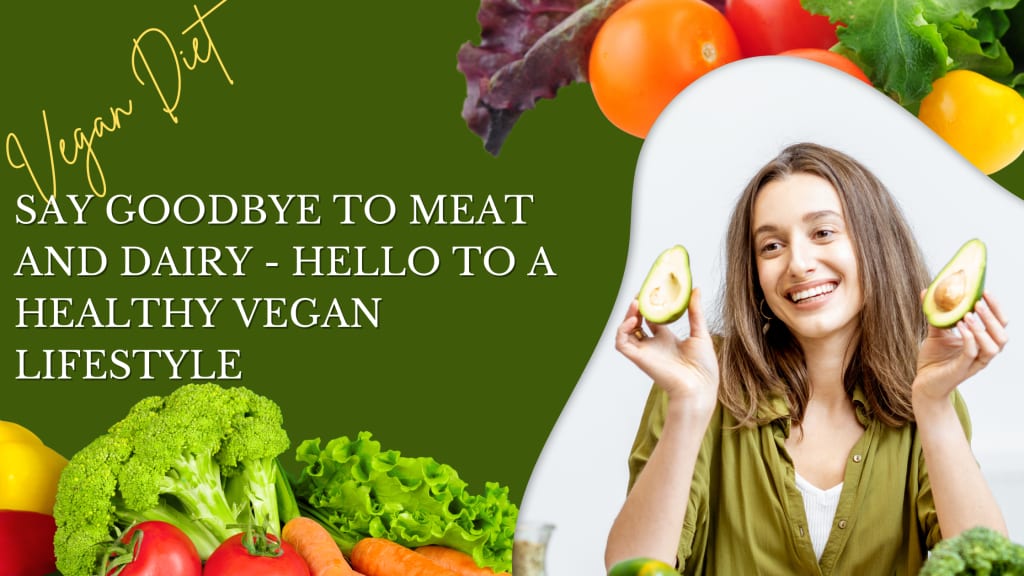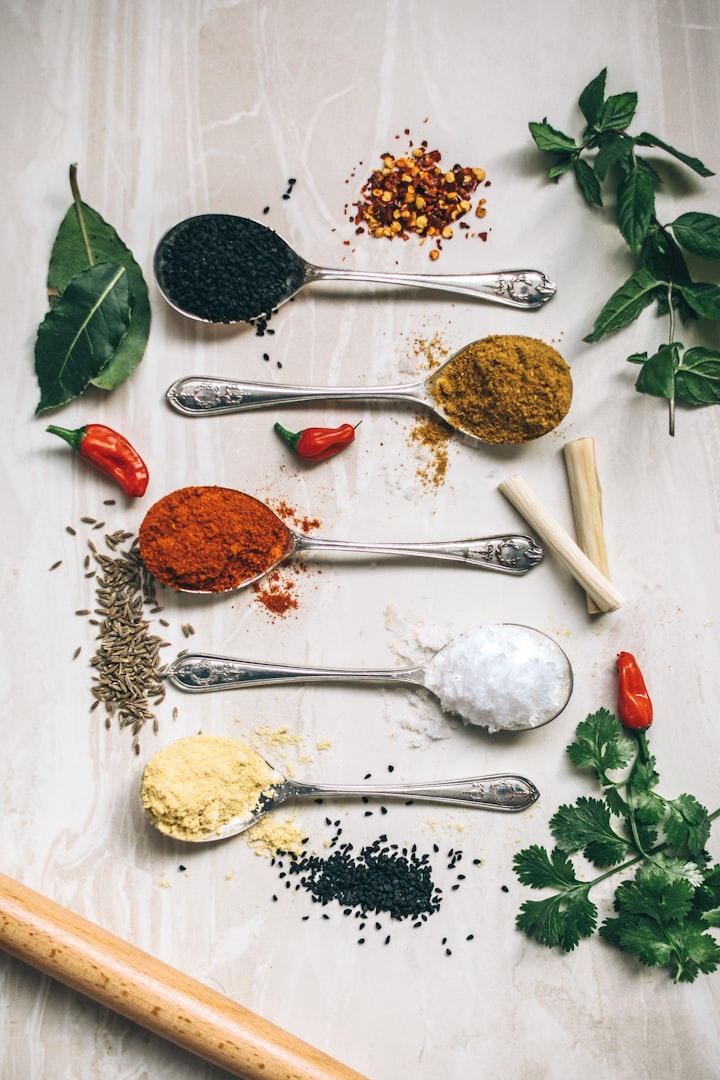Transitioning to a Vegan Diet: Tips and Tricks for Success
Hello to a healthy vegan lifestyle

Can a Vegan Diet Be Healthy?
A vegan diet is a plant-based diet that excludes all animal products, including meat, poultry, fish, dairy, and eggs. Instead, vegans focus on eating a variety of whole plant-based foods, such as fruits, vegetables, legumes, whole grains, nuts, and seeds. Veganism is often motivated by ethical, environmental, and health reasons.
A well-planned vegan diet can provide all the necessary nutrients for optimal health, including protein, carbohydrates, healthy fats, fiber, vitamins, and minerals. However, it's important to be mindful of certain nutrients that are commonly lacking in a vegan diet, such as vitamin B12, iron, calcium, and omega-3 fatty acids. Vegans can obtain these nutrients through plant-based sources or supplements.
In addition to health benefits, such as reducing the risk of chronic diseases like heart disease and type 2 diabetes, following a vegan diet can also have environmental benefits.
It's important to note that a vegan diet is not for everyone and may require careful planning to ensure adequate nutrient intake.
Nutrition on Vegan Diet
A vegan diet that is well-planned can offer all the nutrients required for a healthy body. Here are some key nutrients of a vegan diet:
- Protein: Good sources of protein for vegans include legumes (e.g., lentils, beans, chickpeas), tofu, tempeh, seitan, nuts, and seeds.
- Iron: Iron-rich foods for vegans include beans, lentils, spinach, tofu, fortified cereals, and dried fruits.
- Calcium: Good sources of calcium for vegans include fortified plant milk, calcium-set tofu, kale, collard greens, and fortified juices.
- Omega-3 fatty acids: These essential fatty acids can be obtained from flaxseeds, chia seeds, hemp seeds, walnuts, and algae-based supplements.
- Vitamin B12: This important nutrient is naturally found only in animal products, so vegans should obtain it from fortified plant milk, fortified breakfast cereals, or supplements.
- Vitamin D: Good sources of vitamin D for vegans include fortified plant milk and cereals, mushrooms, and exposure to sunlight.
- Zinc: Vegan sources of zinc include beans, nuts, whole grains, and fortified breakfast cereals.
- Vitamin C: This antioxidant is abundant in fruits and vegetables, which are staples of a vegan diet.
It's important for vegans to consume a varied and balanced diet to ensure they're meeting their nutrient needs.
Many health advantages of the vegan diet include:
- Reduced risk of chronic diseases: Studies have shown that a vegan diet can reduce the risk of chronic diseases such as heart disease, diabetes, and certain cancers.
- Lowered blood pressure and cholesterol levels: Vegan diets can be naturally low in saturated and trans fats, which can contribute to lower blood pressure and cholesterol levels.
- Weight loss: A well-planned vegan diet can lead to weight loss due to its focus on whole plant-based foods that are typically lower in calories than animal products.
- Improved digestion: Vegan diets are often rich in fiber, which can promote healthy digestion and prevent constipation.
- Clearer skin: Some people report clearer skin after switching to a vegan diet, possibly due to the abundance of plant-based foods that are high in antioxidants.
- Better animal welfare and environmental impact: Many people choose a vegan diet for ethical reasons, as it avoids the harm and suffering of animals, and can also have a positive impact on the environment by reducing greenhouse gas emissions and conserving water.
It's important to note that simply adopting a vegan diet does not guarantee good health, as it still requires careful planning to ensure all nutrient needs are met.
Here are some meal-planning tips for a healthy and balanced vegan diet:
- Incorporate a variety of whole grains: Whole grains are an excellent source of carbohydrates, fiber, and B vitamins. Choose from options such as brown rice, quinoa, oats, barley, and whole wheat pasta.
- Include a variety of fruits and vegetables: Fruits and vegetables provide a wide range of vitamins, minerals, and antioxidants. Aim for a variety of colors and textures, such as leafy greens, berries, citrus fruits, cruciferous vegetables, and root vegetables.
- Incorporate protein-rich foods: As mentioned earlier, vegans can obtain protein from legumes (e.g., lentils, beans, chickpeas), tofu, tempeh, seitan, nuts, and seeds. Make sure to include these foods in your meals to meet your protein needs.
- Add healthy fats: Fats are important for overall health and can help to keep you feeling full and satisfied. Healthy vegan sources of fats include nuts, seeds, avocados, olives, and plant oils such as olive oil and coconut oil.
- Plan ahead for snacks: Vegan snacks can be simple and nutritious, such as fresh fruit, raw veggies with hummus, nuts, and seeds, or a homemade energy ball.
- Experiment with vegan recipes: There are countless vegan recipes available online, from simple salads to elaborate plant-based meals. Experiment with different cuisines and ingredients to keep your meals interesting and varied.
- Consider supplementation: As mentioned earlier, vegans may need to supplement with vitamin B12 and possibly other nutrients. Consult with a healthcare professional or registered dietitian to determine if you need any supplements.
Remember to focus on whole, plant-based foods and strive for a varied and balanced diet to ensure you're getting all the necessary nutrients for good health.
Possible Challenges with Vegan Diet
Switching to a vegan diet can come with its own set of challenges, especially for those who are used to consuming animal products. Here are some potential challenges one may face when switching to a vegan diet, along with tips for overcoming them:
- Social situations: Social situations that involve food can be challenging for those following a vegan diet, especially if the host or restaurant is not vegan-friendly. It can be difficult to explain the reasons for following a vegan diet or to navigate the menu.
Tip: Before attending a social event, reach out to the host or restaurant to inquire about vegan options. If necessary, bring a vegan dish to share. Consider bringing snacks to keep yourself full in case vegan options are not available.
- Dining out: Eating at restaurants can be tricky for vegans, especially if the restaurant does not offer vegan options or the staff is not familiar with vegan diets.
Tip: Research vegan-friendly restaurants in your area and check menus ahead of time. Call ahead to ask if the restaurant can accommodate your dietary needs. If vegan options are limited, consider ordering a few side dishes or requesting a customized dish.
- Nutrient deficiencies: Vegans may be at risk for certain nutrient deficiencies, such as vitamin B12, iron, and calcium, which are commonly found in animal products.
Tip: Make sure to incorporate a variety of nutrient-dense foods into your diet, including leafy greens, nuts and seeds, whole grains, legumes, and fortified foods such as plant-based milk and breakfast cereals. Consider taking a vegan-friendly multivitamin or supplementing with individual nutrients if necessary.
- Cravings: It can be difficult to give up certain foods, especially if they were a regular part of your diet before transitioning to a vegan diet.
Tip: Try finding vegan versions of your favorite dishes or snacks, or experiment with new plant-based recipes. Focus on incorporating whole, nutrient-dense foods into your diet to help curb cravings and promote overall health.
- Time and convenience: Preparing vegan meals from scratch can be time-consuming and require more planning than a standard diet.
Tip: Plan ahead by meal prepping and making large batches of vegan staples such as grains and legumes. Use convenience items such as canned beans and frozen vegetables to save time. Invest in vegan cookbooks or online resources for inspiration and recipe ideas.
Overall, switching to a vegan diet may come with its own set of challenges, but with some preparation and persistence, it can be a fulfilling and healthful choice. Remember to focus on nutrient-dense whole foods and find ways to make the transition work for your lifestyle.
In conclusion, a vegan diet can offer many health benefits, including improved heart health, weight management, and a reduced risk of chronic diseases. It is important to ensure adequate nutrient intake when following a vegan diet and to be mindful of potential challenges such as social situations and dining out. However, with some planning and preparation, incorporating more plant-based foods into your diet can be a fulfilling and healthful choice. Consider experimenting with new plant-based recipes, incorporating whole, nutrient-dense foods, and supplementing with necessary nutrients. By incorporating more plant-based foods into your diet, you can improve your overall health and well-being.
About the Creator
Helan D. Jhonson
Welcome,
I believe that a healthy lifestyle is needed for a happy life, I'm a writer passionate about physical and mental health. Follow me for tips, and inspiration to help you live your best life.
https://welnesswisdom.blogspot.com/






Comments
There are no comments for this story
Be the first to respond and start the conversation.